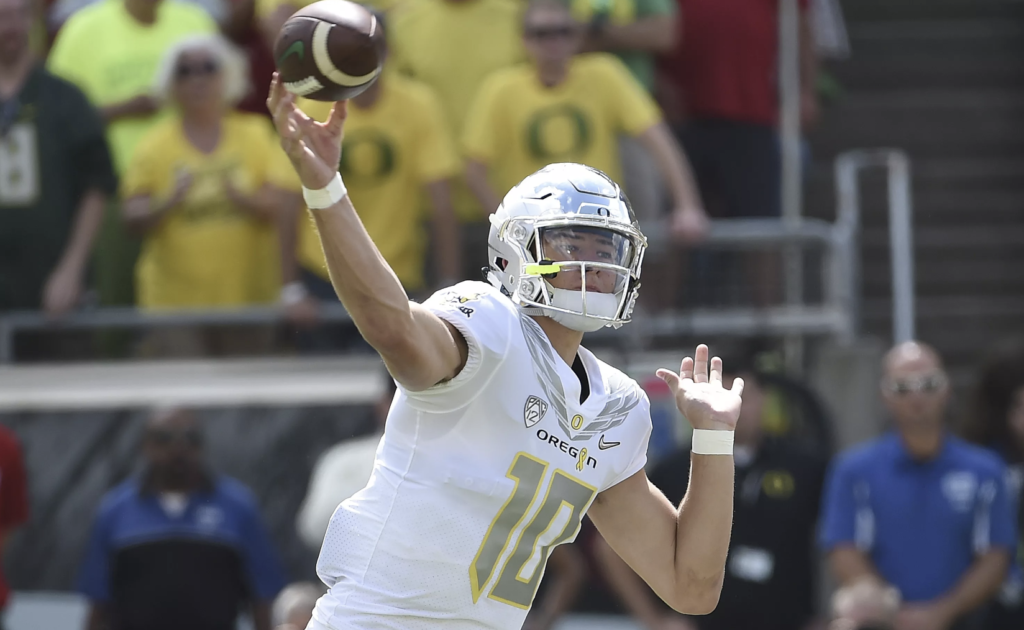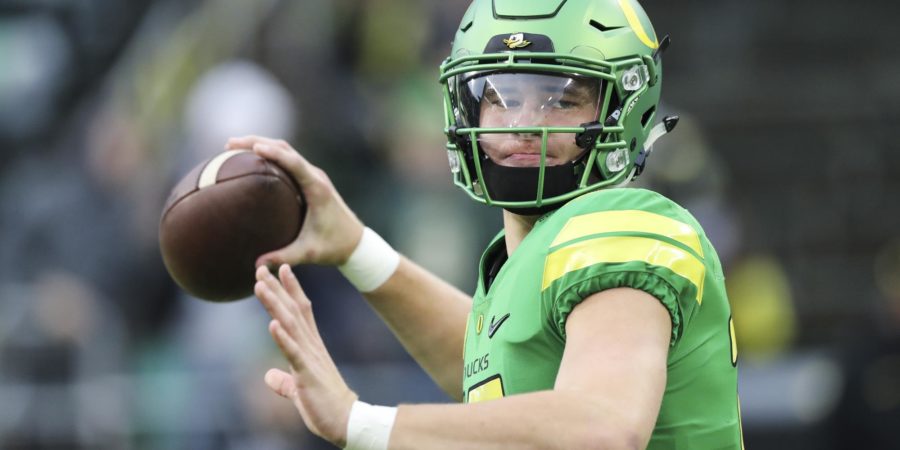The “Is [insert athlete’s name] elite?” question is as time-honored as anything that has ever existed in sports.
In fact, a variation of this question has likely been applied throughout human history, as one can easily imagine the chroniclers of Ancient Greece offering up Hellenistic period hot takes on whether Alexander the Great was really all he was cracked up to be during his conquest of the known world.
In more contemporary times, however, the question has oft been mocked, famously achieving meme status following the Baltimore Ravens victory over the San Francisco 49ers in Super Bowl XLVII, when much of sports media blustered whether the win solidified Ravens quarterback Joe Flacco as “elite.”
In Eugene, the absurdity of that question hasn’t quite taken root in attempts to assess the play of Oregon quarterback Justin Herbert. Yet, as the season approaches, it’s not completely off-base to wonder whether the Eugene native is truly one of the nation’s top quarterbacks (think Baker Mayfield), or is simply a quarterback with first-round tools and measurables minus the accomplished collegiate résumé (think Josh Allen).
Those who’d argue that Herbert falls into the former category need look no further than last year, and compare what the Oregon offense looked like with him in the starting lineup to what it looked like without him. With Herbert in the starting lineup a season ago, the Ducks were 6-2 and featured one of the nation’s most explosive offenses, scoring just over 49 points per game and averaging 516.5 yards of total offense. Without him, it’s a stretch to say that the Oregon offense was even a shell of its former self, as the Ducks averaged 15 points and 320 yards of total offense per contest over a five-game stretch.
Skeptics, however, will posit that Herbert’s 6-2 record as a starter last season was mostly inflated by the Ducks taking advantage of weak competition.
And they wouldn’t be wrong.
Of the six victories Herbert earned in 2017, only two came against opponents who finished 2017 with a winning record (at Wyoming and vs. Arizona), and none came against an opponent who finished ranked in any of the final Top 25 polls. In his lone performance against a team that finished in the Top 25, Herbert was arguably at his worst, completing only 56.5 percent of his passes for 233 yards, two touchdowns, and two interceptions in a 38-28 loss to Boise State in the Las Vegas Bowl.

Of course, it must be noted that Herbert’s collarbone injury prevented him from playing against some of the Pac-12’s best teams last season in Washington, Stanford, and Washington State. It’s also fair to point out that the distractions surrounding the Oregon program at the time of the Las Vegas Bowl loss were real. The Ducks were only days removed from the emotional gut punch of Willie Taggart’s departure for Florida State, not to mention were forced to close on key recruits before college football’s first ever early signing period, while also preparing for a bowl game with a coaching staff whose future with the program was largely uncertain – all within a span of one to two weeks.
Still, Herbert’s overall track record – particularly against top flight competition – is largely incomplete, if not underwhelming. Even dating back to 2016, Herbert has found little success – in terms of wins – against the best teams on the Ducks’ schedule. While the team as a whole was woeful that season, the Herbert-led Ducks were pummeled by Washington, USC, and Stanford by a combined score of 167-68, as all three teams finished the year ranked in the top 12 of the final AP rankings.
The encouraging thing for Duck fans is that, even in those high profile losses, Herbert demonstrated the ability to be competent despite leading teams who were overmatched. In those 2016 losses to the Huskies, Trojans, and Cardinal, Herbert – as a true freshman – still completed 61.9 percent of his passes for 615 yards (205 yards/game), five touchdowns, and three interceptions. And yes, he even led the Ducks to a surprise win in Salt Lake City over Utah, who finished 2016 ranked No. 23 in the AP poll, completing nearly 70 percent of his passes (69.8) for 324 yards, three touchdowns, and no interceptions.
Entering 2018, there’s no denying that the team Herbert leads is collectively more talented than any he has had in the three years he’s been on campus. And with a schedule that is as favorable as any at the Power 5 level – including home games against the class of the conference in Stanford and Washington – there would be no sugarcoating the disappointment if Herbert and the Ducks failed to improve upon last season’s 7-6 record.
In actuality, it’s entirely plausible that Herbert’s success this year will hinge less on his capacity for greatness, and more so on the effectiveness of Oregon offensive coordinator Marcus Arroyo and his ability to consistently put Herbert and the Oregon offense in positions to succeed – though that’s another topic for another day.
Can we confidently say Justin Herbert is elite?
Not yet, but opportunity knocks, and at the very least, the evolving narrative around Oregon’s junior signal-caller should stand as one of the more compelling storylines surrounding a draft-eligible quarterback this fall.

